Nelson Mandela University - a living laboratory for experimentation and innovation
“Our university is a living laboratory for experimentation and innovation where our 27 000 students are encouraged to develop new ideas, new inventions and new approaches to being in the world. The answers to the epic challenges of our time are right here, on earth, in our oceans and within ourselves.” – Vice-Chancellor, Professor Derrick Swartz.
In 2017 Nelson Mandela University celebrates its new name by living up to its new motto ‘Changing the World’.
Our University has a distinctive, forward-looking teaching and learning culture of enquiry, engagement and humanising pedagogy. We excel in applied and theoretical teaching and research. We promote trans-disciplinary and inter-disciplinary research between the Sciences and the Humanities at our University and in our partnerships with other universities in South Africa and globally.
Nelson Mandela University has seven campuses (including our new Marine and Maritime Campus to be launched in 2017) and seven faculties in two cities (Port Elizabeth and George), 3000 staff members, 450 academic programmes and a wealth of strong partnerships with industry, communities, state institutions and universities on six continents.
As a comprehensive university, we offer undergraduate and postgraduate degrees, diplomas, certificates, short course and programmes in all seven faculties. By 2020 our postgraduate students will comprise 20% of the student body.
Nelson Mandela University’s Faculties are:
-
Faculty of Arts
-
Faculty of Health Sciences
-
Faculty of Business and Economic Sciences
-
Faculty of Education
-
Faculty of Engineering, the Built Environment, Information and Technology
-
Faculty of Law
-
Faculty of Science
We are currently re-creating and re-engineering the structure of our University and how it functions to meet current development, research, sustainability and employment needs.
We are here to ensure that all deserving students have the opportunity to study at Nelson Mandela University irrespective of their finances, and we are committed to continuously creating the best possible learning opportunities for the development of each of our student’s full potential.
Our University was the first in the country to create a centre specifically aimed at proactively encouraging non-racial, democratic citizenship. Called the Centre for the Advancement of Non-Racialism and Democracy (CANRAD) it was launched in 2010 in response to the grave concern that racism and its associated impacts on development has not been given sufficient scholarly attention in South Africa. CANRAD’s vision is ‘To lead the advancement of non-racialism and democracy within the University and broader society’.
Humanising pedagogy
Our University is recognised as a leader in the field of ‘humanising pedagogy’ or the ‘humanisation of education’.
It is about dislodging outdated theories and narrow-minded preconceptions of teaching, learning and human engagement in order to stimulate an oxygenated, enquiring approach to education.
It is not a soft pedagogy; it is about courageously confronting the hard educational and relationship issues we face in South Africa.
It is about igniting young minds to take flight and become passionate, compassionate, effective graduates. It is about holding people to high expectations and helping them to achieve this.
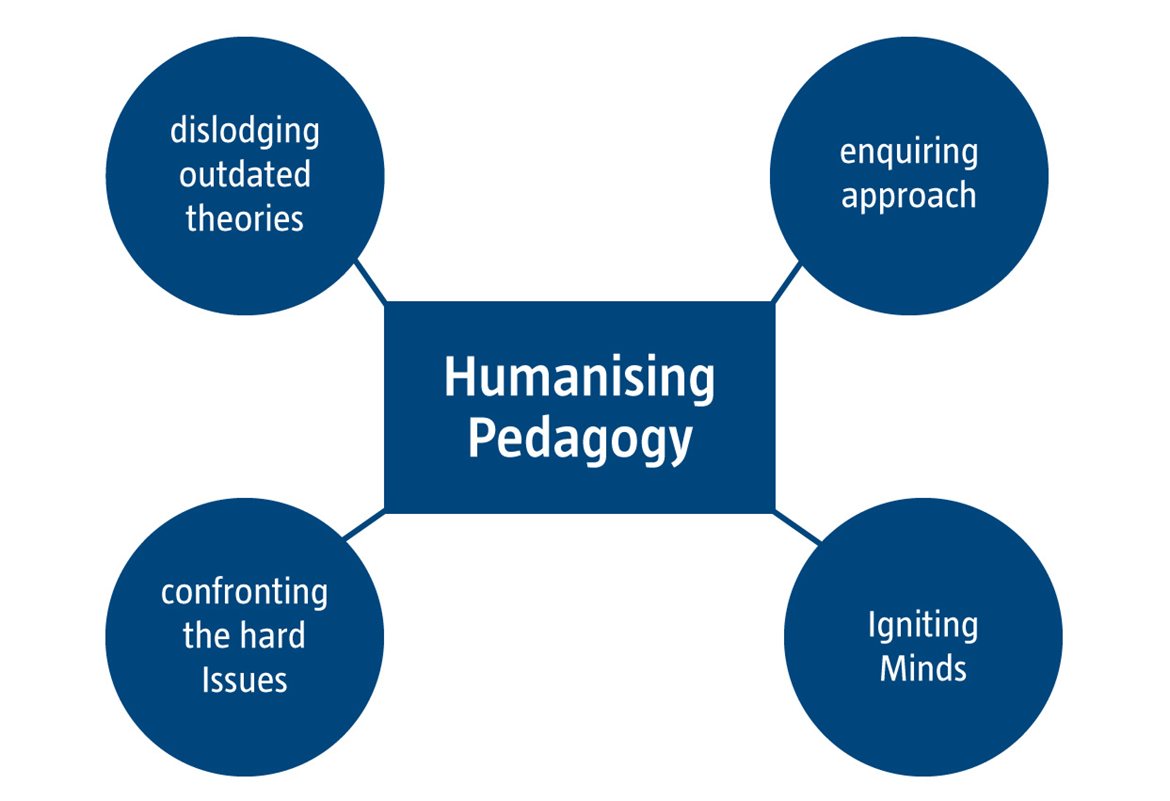
Humanising pedagogy also recognises the diversity of backgrounds in which learners grow up and to ensure this is recognised and developed within our universities.
Our University would not have transformed as much as it has without these deep-rooted socio-political and philosophical foundations. It brings together staff and students from diverse backgrounds and divergent ideologies and requires of them to make a heartfelt and lived commitment to a transformed culture of equality, democracy and respect.
It has taken an enormous amount of compassionate leadership and deliberate interventions such as the ‘Courageous Conversations’ workshops where staff members are students are guided through the painful process of speaking their minds, sharing honest perceptions, shedding deep-rooted prejudices and getting to know each other as human beings.
All of these initiatives have informed our 2020 vision and mission to be a dynamic community of leaders and scholars, committed to:
-
Creating a vibrant, socially just and democratic society; and
-
Developing students into critical thinkers, skilled citizens and agents of hope.
Nelson Mandela University’s Vision 2020
Our vision 2020 is to be a dynamic African university, offering a wide, diverse range of qualifications from undergraduate to doctoral level, from vocational to professional to academic qualifications.
Our Vision 2020 is to establish the University as a higher education institution of choice for talented staff and students from South Africa, Africa and the rest of the world.
We are committed to promoting equity to access and opportunities in a vibrant, stimulating and richly diverse environment that enables staff and students to reach their full potential.
The pursuit of NMMU’s vision, mission and strategic priorities is underpinned by its core values:
-
Respect for diversity
-
Excellence
-
Ubuntu
-
Integrity
-
Responsibility
-
Respect for the natural environment
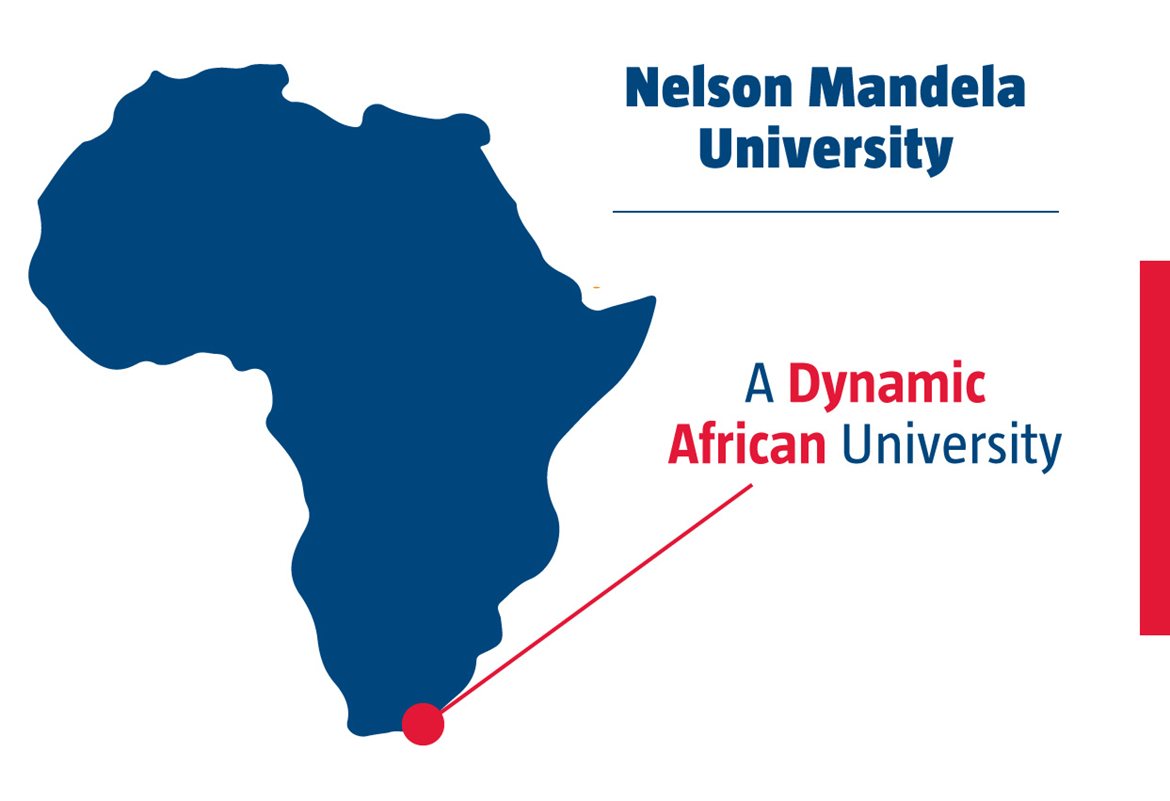
A New Generation, Engaged University
Essential to the transformation of universities is the process of engagement in its many forms, led by Nelson Mandela University’s Centre for Academic Engagement and Collaboration (CAEC).
At Nelson Mandela University engagement is the third, core academic function of our institution, along with teaching and learning, and research. As an engaged, comprehensive University, the integration of the three, core functions determines what we teach and how we teach, as well as what we research and how we research.
Nelson Mandela University recognises four integrated categories of engagement:
-
Engagement through community interaction, partnership and outreach;
-
Engagement through professional and discipline-based service provision;
-
Engagement through teaching and learning; and
-
Engagement through research and scholarship.
Research and Innovation
Our research reputation has grown exponentially as it increasingly responds to the needs of society - regionally, nationally and internationally. We encourage novel research for sustainable solutions, often by bringing together experts from a number of disciplines to provide society with unexpected, tangible, integrated results.
An increasing number of its inventions are being commercialised and its specialist technology centres including InnoVenton and eNtsa are internationally recognised for their practical, industry-focused solutions.
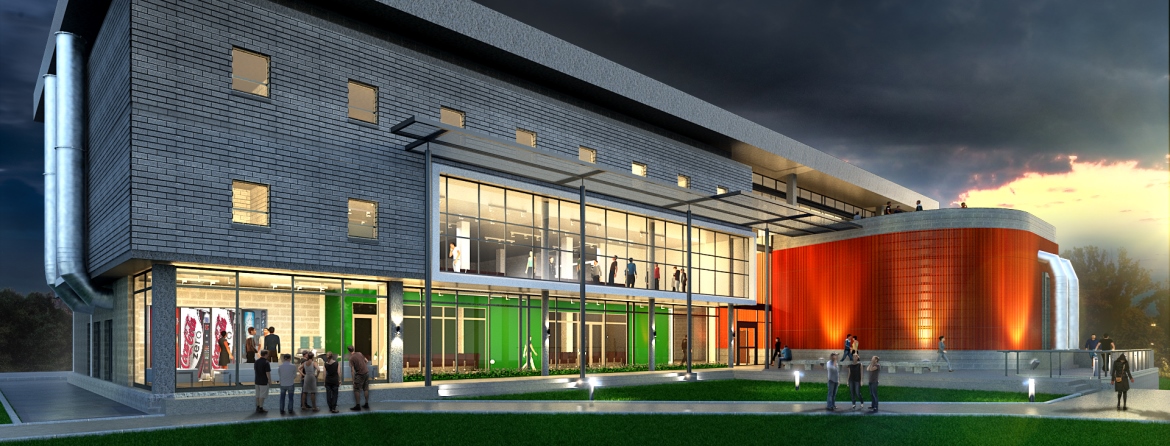
Our relationships with industry and society are strengthened through its many local and international partnerships and research chairs.
Our core research fields include:
-
Science, Mathematics and Technology Education for Society (SMTE)
-
Sustainable local economic development
-
Cyber citizenship
-
Manufacturing technology and engineering
-
Nanoscale characterisation and development of strategic materials
-
Strategic energy technologies
-
Sustainable human settlements
-
Coastal marine and shallow water ecosystems
-
Humanising pedagogies
-
Democratisation, conflict and poverty
-
Biodiversity conservation and restoration
-
Health, medicine and wellbeing
-
Earth Stewardship Science
Our 10 SARChI Chairs
The South African Research Chairs Initiative (SARChI) is designed to significantly expand the research base of South Africa in order to support the implementation of national research and development policies and inititiatives.
-
Nanophotonics
-
Maths Education Chair
-
Law of the Sea and Development in Africa
-
Earth Systems Science
-
Shallow Water Ecosystems
-
Microfluidic Bio-Chemical Processing
-
SA-UK Bilateral Research Chair in Food Security
-
Identities and Social Cohesion in Africa
-
Marine Spatial Planning
-
Food Security
The Innovation Office
There is significant innovation, freedom, creativity and flexibility in the work that our Innovation Office does to facilitate the pipeline of designs, products and processes developed by our researchers from all disciplines, all the way from conception through to commercialisation.
While many universities aspire to this, only a few are successful. It is part of our commitment to spur economic development in the city, region and in South Africa.
The Innovation Office works closely with two partners – Propella and Innovolve - in order to optimally achieve its objectives:
Propella
In June 2015 the Innovation Office launched Propella - South Africa’s first innovation hub for existing and start-up businesses. Propella is based in Port Elizabeth and its main areas of focus include renewable energy generation, energy efficiency and related technologies, advanced manufacturing and supply chain optimisation. Creative industries are also supported.
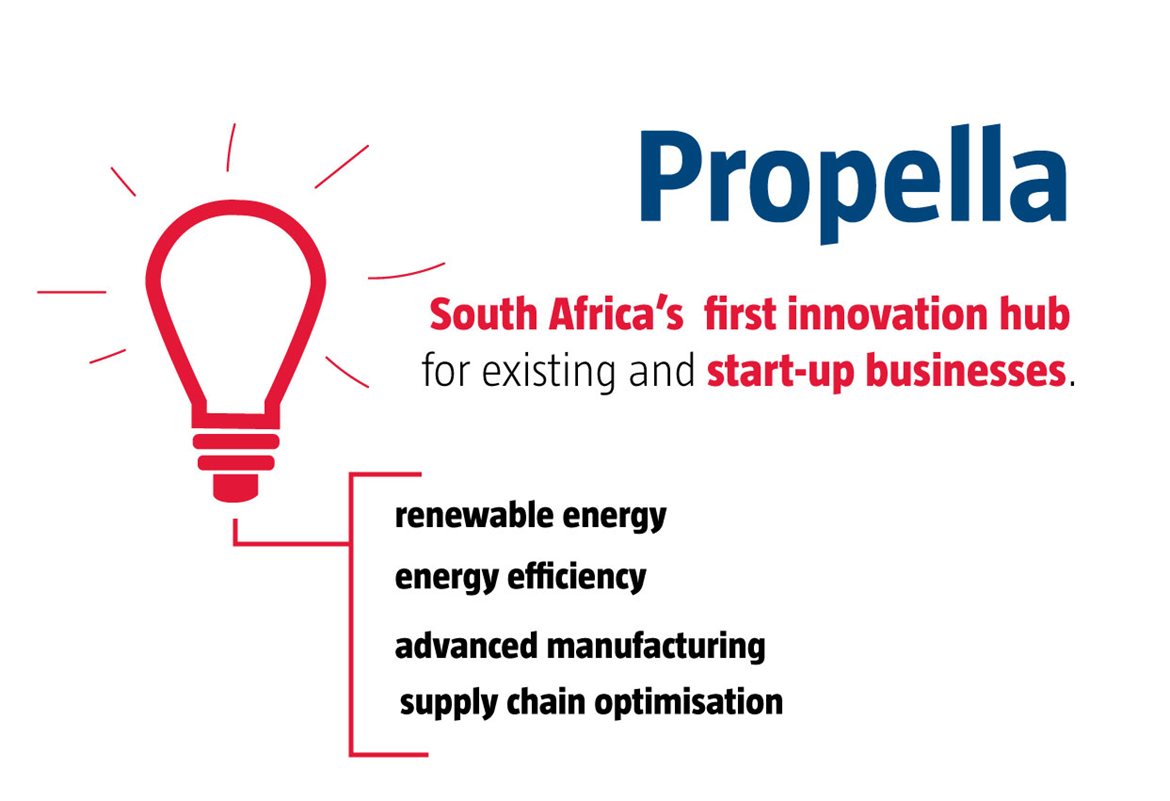
On campus, the Innovation Office has made a significant contribution to the development of the technology transfer profession locally and internationally in a number of fields.
Innovolve
Innovolve is Nelson Mandela University’s wholly owned commercialisation company. It works closely with the Innovation Office to drive the commercialisation of NMMU’s innovations through the licensing of intellectual property and the establishment of spinout companies. Innovolve is committed to the development of the metro and province through the development of sustainable businesses.
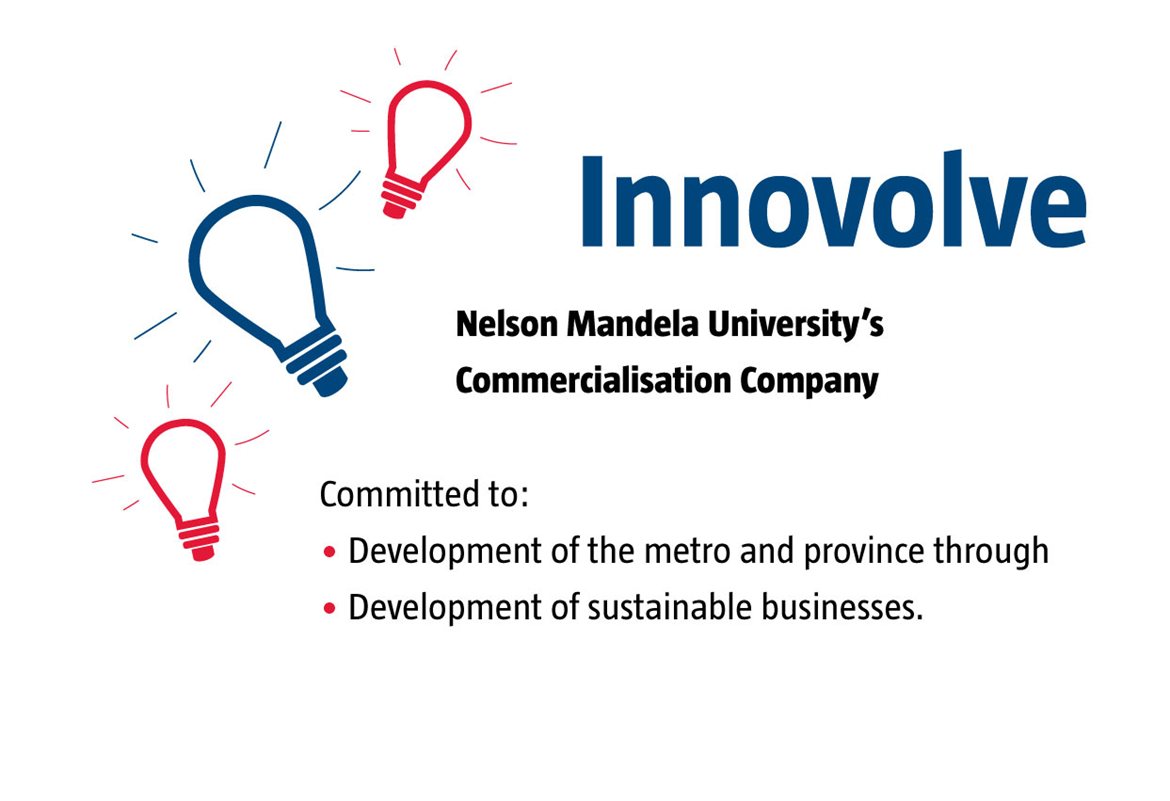
These include:
-
The Green Economy with several inventions produced by Nelson Mandela University’s Centre for Energy Research (CER), including a solar-powered streetlight, the Intellectual Property for which has been licensed to a business. Its current flagship project is an energy storage device for renewable energy as an alternative to batteries, which are expensive and environmentally unfriendly.
-
Innovative algae technology that could turn millions of tons of coal dust annually wasted in South Africa and elsewhere into high quality, clean fuel called Coalgae™. This is the brainchild of InnoVenton: Institute for Chemical Technology, a formally registered research institute at Nelson Mandela University.
A world going circular
The Innovation Office is also committed to the exploration of new economic models that could better serve South Africa and the world in this era and going forward, based on the reality of finite natural resources.
The reality is that the 20th century neoliberal extraction model is not sustainable; there are simply not enough resources or sufficient access to resources at affordable costs to grow and expand economies.
Radical new models of sustainable economic growth are required and our Innovation Office is taking the lead in exploring the Circular Economy. This is an exciting new global approach based on the re-use of resources and the remanufacturing of goods.
It is a move away from disposable consumerism and a move towards an economic system that can feasibly address the severe economic and education disparity, unemployment, food and water shortages that we face in South Africa today.
“Overcoming poverty is not a task of charity, it is an act of justice. Like Slavery and Apartheid, poverty is not natural. It is man-made and it can be overcome and eradicated by the actions of human beings. Sometimes it falls on a generation to be great. YOU can be that great generation. Let your greatness blossom.” – Nelson Mandela
Expanded thinking, life opportunities, development
Mandela showed how education that is designed for the common good and for human emancipation, expands people’s thinking and worldview, increases life opportunities, enables the transformational development of all communities in many different ways and brings people together.
In a world going circular, Nelson Mandela University is taking the lead in South Africa to mobilise around this idea in academia and the private sector, together with our young people who need to explore new social and economic solutions and implement new approaches.
We need to identify markets in South Africa and Africa that could advance the notion of a circular industry on the back of new technology. It is possible to take a giant leap past wasteful manufacturing towards waste-less remanufacturing. Whether it is the remanufacturing of cars from existing car parts or the recycling of carbon in grassland restoration, our University will lead the way.
Leading the World
Nelson Mandela University is leading the world in a number of disciplines. These include:
-
Physics research through our High Resolution Transmission Electron Microscope (HRTEM), the only one in Africa, which is able to see right down to the atom level. Research here attracts scientist from all over the world and outputs includes nanoscience contributions to electricity, computers, clean air and water.
-
The Centre for Broadband Communication & the SKA - the SKA is a mega-science multi-national project, backed by South Africa’s Department of Science and Technology (DST), to build a radio telescope up to 50 times more sensitive, and 10 000 times faster survey speed, than today’s best radio astronomy facilities. Building the SKA requires the development of cutting-edge technology and innovation. This is where Nelson Mandela University’s Centre for Broadband Communication comes into play as its researchers seek solutions to provide faster, cheaper next generation optical communication systems for aggregating tremendous amounts of data. At the same time, there is a direct correlation between a country’s telecommunication infrastructure and its economic and social wellbeing. For maximum global economic competitiveness, South Africa needs broadband connectivity. The Centre for Broadband Communication represents a key step in developing resources necessary to ensure that South Africa and all South Africans are connected by 2020.
-
Nelson Mandela University’s applied engineering research and development group, eNtsa. A prominent research, design and technology support unit for the advanced manufacturing sector in South Africa, it is working on the development of new technologies to create a commercially viable infrastructure for the use of electric vehicles. An inestimable contribution by this team to the world is the approval in 2015 of the Nelson Mandela University/Eskom Weldcore process, approved by the American Society for Materials Engineers (ASME). In engineering terms this is a major achievement, following 12 years of fundamental research by three PhD students and five Master’s students and an investment of R32million to change the way engineers look at life extension of high value engineering components. This is of invaluable importance to South Africa as most of Eskom’s power turbines are older than 30 years. This process not only legally and safely extends their life but also has vast application and commercial potential internationally.